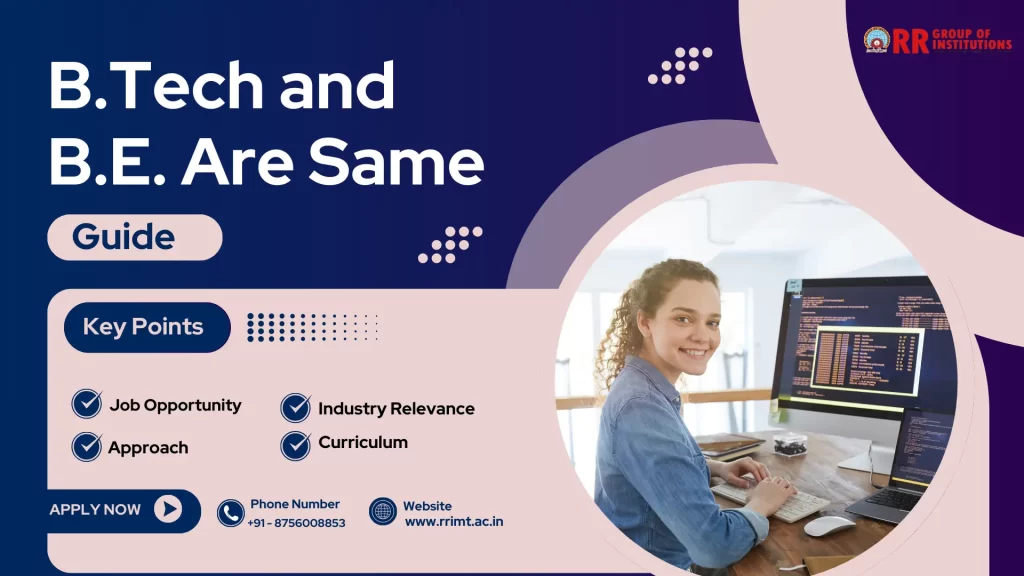
Many times, students entering the realm of engineering education wonder, “Is there any difference between B.Tech and B.E.??” Though there are minor differences that will direct your decisions, the answer is not particularly different. Though their approaches, curriculum, and emphasis areas differ somewhat, both degrees seek to equip students for a future in engineering.
Everything you need to know about B.Tech (Bachelor of Technology) and B.E. (Bachelor of Engineering) will be broken down in this post together with their similarities, contrasts, and which one would be best fit for you.
What Are B.Tech and B.E.?
Let’s clarify the fundamental definitions before delving into comparable:
- Bachelor of Technology (B.Tech): A degree in professional engineering with an eye toward technical and practical expertise. Emphasizing hands-on learning, commercial applicability, and creativity, this curriculum.
- Bachelor of Engineering (B.E): A conventional engineering degree emphasizing theoretical understanding and solid engineering basic ideas. It favors academic and research-oriented education more especially.
Similarities Between B.Tech and B.E.
The two degrees cross in the following main respects:
- Both run four years and are undergraduate engineering degrees.
- In India, both AICTE (All India Council for Technical Education) and UGC (University Grants Commission) acknowledge the degrees.
- Both programs provide a wide spectrum of engineering fields, including computer science, mechanical, civil, electrical, etc.
- Graduates of both programs are qualified for comparable employment, additional education, and competitive tests such GATE, UPSC, etc.
Differences Between B.Tech and B.E
Although their degrees are essentially the same, there are a few minor variations separating them. Better clarity would come from a tabular comparison here:
| Aspect | B.Tech (Bachelor of Technology) | B.E. (Bachelor of Engineering) |
| Focus Area | Emphasizes practical applications and technical skills. | Focuses more on theoretical and conceptual understanding. |
| Curriculum | Industry-oriented with more lab work, internships, and projects. | Fundamental concepts with more theory-based coursework. |
| Approach | Hands-on, skill-driven approach to solving real-world problems. | Analytical, research-oriented approach to engineering. |
| Industry Relevance | More aligned to current industry demands and technologies. | Prepares students for academic or research roles. |
| Institutions | B.Tech programs are offered most by private universities, NITs, and most IITs. | Some state and central universities prefer offering B.E. |
| Job Opportunity | Slight edge in corporate and technical roles due to hands-on skills. | Preferred for R&D, academia, or government roles. |
Key Differences Explained in Detail
1. Curriculum Design
B.Tech: To fit industry developments, the curriculum is more dynamic and regularly changed. For instance, B.Tech courses in IoT, blockchain, and machine learning come sooner than those in B.E.
B.E.: Usually, the syllabus keeps to fundamental engineering ideas. Usually involving less regular updates, it emphasizes academic rigors instead.
2. Career Prospects
Graduates from B.Tech: For positions in MNCs, startups, and private tech companies, they are much sought for. Companies recognize their ability to change with the times and their practical talents.
B.E. graduates may have a modest advantage in government employment, research projects, or roles needing a more advanced knowledge of engineering concepts.
3. Institutional Preference
Many prominent colleges, like IITs and NITs, provide B.Tech degrees, thereby supporting their contemporary and pragmatic attitude.
Emphasizing a strong basis in engineering disciplines, universities including Anna University, R.R. Group of Institutions, and others usually offer B.E.
Which One Should You Choose?
Ask yourself these questions to help you sort B.Tech from B.E.:
- Do you lean more toward practical instruction or pure academic knowledge?
-
-
- If you want practical applications, software development, or new technologies, choose B.Tech.
- If you find yourself inclined to research, academic responsibilities, or conventional engineering disciplines, choose B.E.
-
- Are internships and industry contacts important to you?
-
-
- B.Tech courses usually provide more internship chances and have closer linkages with sectors.
-
- Long term, what do you want to do?
-
- A B.Tech degree can be more suited for your intended career in IT, private tech companies, or startups.
- B.E. could be the better fit for jobs in government engineering, R&D, or teaching.
Myths About B.Tech and B.E.
Let us debunk some prevalent misconceptions:
- “B.E. is outdated compared to B.Tech.” false! Although the B.E. curriculum is more conventional, it nevertheless has great significance, particularly in research and academic spheres.
- “B.Tech graduates left behind B.E. graduates.” B.Tech is not the degree itself; salary depends on things like abilities, occupation, and experience.
- “B.Tech offers better IT employment.” While B.Tech may have an advantage in industry-oriented jobs, B.E. graduates are equally equipped to succeed in IT employment after honing the required skills.
Final Thoughts
B.Tech and B.E. are not very different at the end of the day; both degrees provide you the tools and knowledge to succeed in the engineering industry. More than the particular degree, your employment success relies on your abilities, specialization, and effort.
Key lessons are briefly summarized here:
- For a more useful, industry-aligned experience, go to B.Tech.
- Choose B.E. if you lean toward theoretical understanding or research.
- Regarding placements, further studies, and professional development, both degrees present equal possibilities.
Engineering is a flexible and fulfilling profession that presents a universe of possibilities regardless of the road you decide upon. Emphasize developing your abilities, following the newest trends, and optimizing your knowledge.

